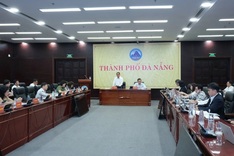The civil servants working in the education sector, ranging from scientists to teachers, understand that curriculum is the most important factor that impacts the quality of ones education, and therefore, it is always something being analysed and amended.

Caught between system and curriculum
Education reform implemented since the 1950's highlights the importance of curriculum. In 1950, reforms focused on changing the twelve grade system into a compacted nine grade formula. In 1956, reforms focused on two basic tasks:
1) The nine grade system was changed into ten grades.
2) Curriculum and texts were copied from socialist countries (mainly the Soviet Union.)
Reforms reached a milestone in 1975 with the emergence of national unification. The government insisted that our education background and standards be as high as it was in other countries. This had a huge impact on curriculum and influenced the preparation of school texts. It also made it so that the more knowledge, the better and paved the way for new reforms in 1980.
Education reforms in 1980 once again focused on two tasks:
1) A return to a 12 grade system.
2) Developing new curriculum, texts, and amending script. These were challenging reforms because of the voluntary nature of study. This led to curriculum and school texts being overloaded with information. As a result, prior to the following reforms, our education again reduced study-load.
Education reforms in 2000 again focused on two tasks:
1) Renew curriculum and textbooks. Exactly what needed to be changed in the curriculum remained a question and there was a dispute about whether the order of the letters “a” and “e” should be script in capital or not...
2) Teaching method renewal was the main target of the reforms with billions of Vietnamese Dong invested in education equipment. This improvement of the education system differed from others by using foreign capital investment through projects but ultimately the curriculum and schoolbooks amended were not improved.
In all actuality, these reforms did not meet the its goals, instead it wasted billions of Vietnamese dong and left education quality remaining a huge concern.
In light of these facts, at a recent Curriculum and Schoolbook Conference, the Ministry of Education revealed that from 2010, the sector will start researching and developing a new general education renovation which will be implemented in 2015. It is expected to integrate at junior grade levels and divide at senior grades.
While it is necessary to correct the wrongs and to continually improve the education sector, the question still remains how to develop new textbooks. It should be noted that by implementing the 2010 plan, the education sector will have carried out two major curriculum and textbook reforms in just ten years.
If one takes a look at all of the reforms, shockingly, they all focused on curriculum and school text amendments but not on finding comprehensive solutions or changing visions. Thus, the education quality continued to deteriorate, and as a result, it drove society into anger.
Therefore, in the context of old mentality, costly expenses of the sector, limited management, guidance and organization abilities, should we be weary of the effectiveness of current curriculum and schoolbooks reform?
New Ideas and Comprehensive Solutions
Why do Asian countries like Singapore succeed in education and develop through it? How about us? For many decades our education system has struggled with curriculum and schoolbook renewal while remaining in crisis. The reason remains that weak social management has played a role, but we cannot turn a blind eye to the defects in the education system itself.
The wrong idea is education renovation for the sake of adults, who serve in the education sector. It has an impact on policies, guidelines and badly influences education quality.
We Need a New Approach
The education cannot change its idea and philosophy which is the foundation of any solution.
So what should be the new idea? Simply speaking: “For the sake of pupils”.
This is not the slogan for a campaign, but it is the nature of an education system in which all guidelines and policies are issued for the sake of national interests.
Along with the new idea, curriculum must also be part of a comprehensive and strategic solution.
New implementations must take the initiative and break the cycle of emulating previous reforms. Issues such as emulation, target, advance schools, advance classes...these are all a "bridge" which some people involved in the education sector use merely to be promoted. Given these pressures, many teachers simply become an accomplice to modifying scores.
In order to break this cycle, the education sector needs to improve their assessment and examination methods. It has to be ensured that they are fair, open, and clear to the public, the education system, and universities. This new approach will stimulate schools and force them to create their own solutions to education quality improvement as well as build up their prestige.
If curriculum and schoolbooks are renovated for a short-term period then the education sector will stay in impasse.
No country can develop through an education system just for the sake of the people who serve in the sector.




















